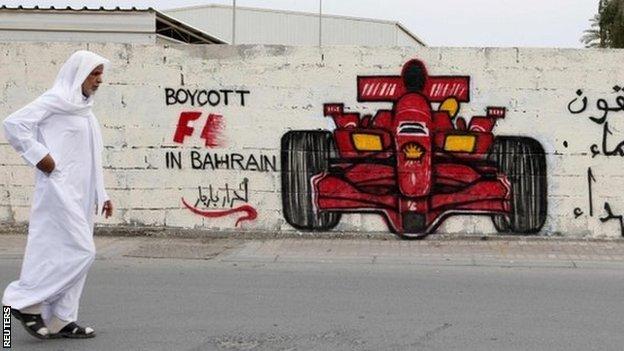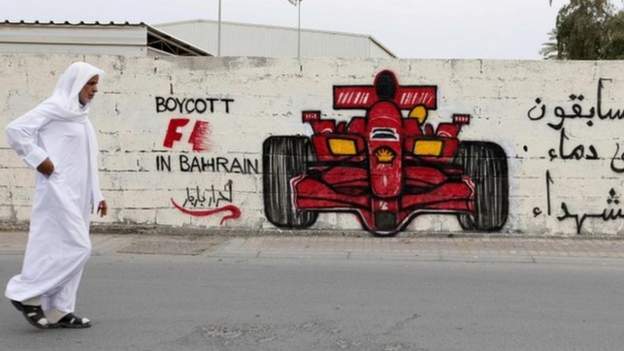
UK MPs have urged Formula 1 to set up an independent inquiry into the links between grands prix and human rights violations.
The move comes before the first race of the 2023 season in Bahrain on Sunday.
Lord Scriven, chair of the parliamentary group concerned with human rights in the Gulf, wants F1 to urge Bahrain to release political prisoners and death-row inmates.
F1 defended hosting races in countries with criticised human rights records.
A statement from F1 said: “For decades Formula 1 has worked hard to be a positive force everywhere it races, including economic, social, and cultural benefits.
“Sports like F1 are uniquely positioned to cross borders and cultures to bring countries and communities together to share the passion and excitement of incredible competition and achievement.
“We take our responsibilities very seriously and have made our position on human rights and other issues clear to all our partners and host countries who commit to respect human rights in the way their events are hosted and delivered.”
The Bahrain race is one of a number of grands prix in countries which have been highlighted by human rights groups as guilty of human rights abuses.
Others include Saudi Arabia – host of the second race of the season a week after Bahrain – Azerbaijan, Qatar and the United Arab Emirates. The Chinese Grand Prix was cancelled this year because of uncertainties surrounding the Covid-19 situation in the country.
There will also be three races this year in the USA, whose use of the death penalty has been criticised by Amnesty International.
Human rights groups accuse regimes in countries such as Saudi Arabia of using global sporting events to distract from their record of abuses and lend them an air of legitimacy. This practice has become known as ‘sports-washing’.
Lord Scriven, a Liberal Democrat member of the House of Lords and vice-chair of the All-Party Parliamentary Group on Democracy and Human Rights in the Gulf, said: “It is a pity that the present leadership of the FIA and F1 seem to think money, profit and their own self-importance are far more important than giving dignity and basic human rights to people in the country that they make profit from.”
The director of advocacy at the Bahrain Institute of Rights and Democracy (Bird), Sayed Alwadaei, added: “It is high time that F1 and the FIA stop allowing their presence in Bahrain and Saudi Arabia to be used to sports-wash the blood-soaked images of these autocracies.
“Despite horrific human rights records, both states enjoy generous F1 contracts and exploit the F1 platform to sanitise their image on the world stage, while thousands of political prisoners languish behind bars.
“F1 must establish an independent and impartial inquiry to examine the role of their races in human rights violations, and the FIA must adopt a human rights policy consistent with UN principles.
“Failure to do so will allow their sport to continue to be used to repair the reputation of brutal dictators.”
A news conference held at the Houses of Parliament in London on Tuesday highlighted the testimony of current and former political prisoners from Bahrain.
Families of death-row inmates at imminent risk of execution have written to F1 drivers to plead with them to intervene.
Ali Al-Hajee, interned at Jau Prison in Bahrain, is quoted by Bird as saying: “It is very unfortunate that Formula 1, as well as many international events that are held in Bahrain, are being employed as a cover-up for curbing freedom of speech and to whitewash human rights abuses.
“As a prisoner of conscience I am serving a 10-year prison sentence since May 2013, for peacefully protesting in the capital, Manama. I was subjected to harsh torture, both physical and mental. My confession under duress was the basis for the 10-year jail sentence.”
F1 has a commitment to human rights in its corporate charter, in which it pledges to “respect internationally recognised human rights in its operations globally”, monitor the human rights impacts of its activities and identify any adverse impacts and “engage in meaningful consultation with relevant stakeholders”.
Bahrain says it is “committed to respecting and promoting” human rights and says it “has made great strides in safeguarding and protecting human rights and preserving the dignity of citizens and residents” with a series of reforms.


